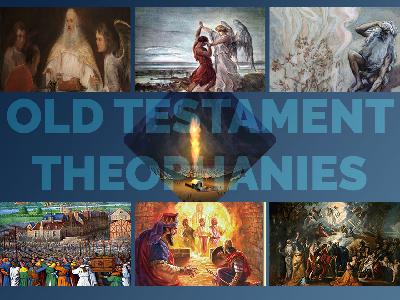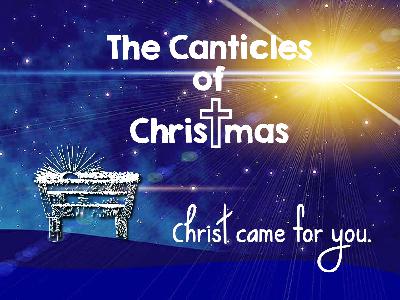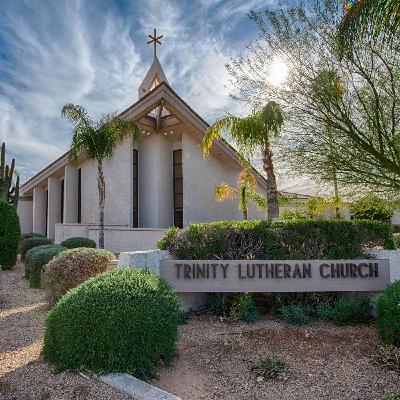Discover trinitylcs's podcast
trinitylcs's podcast

trinitylcs's podcast
Author: Trinity Lutheran Church
Subscribed: 0Played: 72Subscribe
Share
© 2017 Trinity Lutheran Church and School
Description
This is a series of podcasts from Trinity Lutheran Church and School, Litchfield Park, Arizona. We are a member of the Lutheran Church-Missiouri Synod and are a Bible-based, Christ-centered, family-focused congregation.
153 Episodes
Reverse
For it was fitting that He, for whom and by whom all things exist, in bringing many sons to glory, should make the Pioneer of their salvation perfect through suffering. Hebrews 2:10 The word that’s translated as Pioneer can mean Captain or Author. It’s the idea of a leader --- Jesus has already gone through death and resurrection so He can lead us through it as well. He is the Captain of our Salvation journey; He is the Author who writes our faith story. He is the Pioneer who goes first and then comes back and leads us in the way.
Watch Here Download Worship Binder Here How lovely is Your dwelling place, LORD Almighty! My soul yearns, even faints, for the courts of the LORD; My heart and my flesh cry out for the Living God. Psalm 84:1-2 One of the things that that has affected us during this time of “shut-down” and “quarantine” is that we have gone 8 weeks now without public worship --- for many of us, we have never gone that long before! Psalm 84 talks about being away from the house of the Lord and separated from public worship.There is a lot of emotion in these two verses. There is an emptiness behind verses; something is missing when you do not worship the Lord each week!
Watch Video Service Here Download Worship Binder Here Holy Baptism is a ”calling” in your life; that means that the Lord knows you by name and has given you faith; He has brought you into His Kingdom; He has worked in your life with His mighty resurrection power to rescue you from the world, the devil, and your own sinful nature, and He has given you all the gifts of salvation! God's ”calling” to you is personal! One way to think about your Baptismal ”calling” is that you have been brought into the Holy Christian Church; and in the Holy Christian Church there is peace and unity. That peace and unity centers on seven gifts that the Lord freely gives to you and all believers. St. Paul teaches it to us in Ephesians 4.
You have probably heard of the Four Horsemen Of The Apocalypse. It is a graphic way to describe the Signs of the End of the world. We heard about the Four Horsemen today in the reading from the book of Revelation. The Fourth Horseman of the Apocalypse is pale in color; the text actually says it’s greenish in color – like when we say someone who is sick looks “green around the gills.” This Fourth Horseman, which is pale and green in color, brings all kinds of destruction on the earth, including pestilence. This pestilence includes all kinds of sickness and disease, including epidemics and pandemics. We are currently getting a front row look at this green horse.
Problems, pain, and suffering are complicated things. The troubles we face can affect our health, our finances, and/or our relationships. They preoccupy you during the day; they cause you to toss and turn at night; and sometimes they can even change the course of your entire life. They bring worry, stress, fear, and sorrow. It was during some unknown problem, pain, or suffering that King David wrote Psalm 13.
The refrain of Psalm 136 is “for His steadfast love endures forever!” It is repeated 26 times and is the major theme of the Psalm. The refrain is the part that the people say, after the priest said the first part of each verse. That interaction between the priest and the people is the antiphon part of this Psalm – it’s a responsive reading. Whether the people sang it or spoke it, it is a powerful confession of God’s goodness, grace, and mercy.
The Psalms were the “hymnbook” of the Old Testament. Israel used them to worship God, sing His praises, learn His ways, and confess their faith. In addition, the Psalms are a collection of prayers; heart wrenching prayers for all kinds of hardships are included throughout the Psalms. Of the most prominent are prayers for forgiveness. There are seven Psalms that are called Penitential Psalms (6, 32, 38, 51, 102, 130, 143), and they teach us about repentance, sorrow over our sin, and the sure and certain hope of the forgiveness of all of our sins. Psalm 51 is one of those Penitential Psalms.
A Theophany is a “God appearance” in the Old Testament. Specifically, it is the Son of God, the Second Person of the Holy Trinity, who appears on earth before His Incarnation and birth in Bethlehem. In a theophany, the Lord is intervening on behalf of His People. He is saving them, helping them, guiding them, or protecting them. As we wrap up this series today, we want to take a look at a very different kind of theophany – an unique, one-of-a-kind God appearance. That is the Transfiguration.
Today the Reverend Bishop Peter Anabati Abia from the Evangelical Lutheran Church of South Sudan/Sudan shares God's Word with us about being salt and light.
In our story today from the Old Testament, it is now the end of the 40 years in the wilderness. This is the end of the Exodus. Moses has died, Joshua is the leader, the Israelites have crossed the flooded Jordan River on dry ground – just like they crossed the Red Sea on dry ground 40 years earlier. They have celebrated a Passover, and they are now camped a few miles from the Canaanite fortress city of Jericho. Jericho is a military city, and it stands between the Israelites and the Promised Land. It is here where God appears to Joshua. Joshua is given a Theophany; a “God appearance”. Specifically, it is the Son of God, the Second Person of the Holy Trinity, who appears on earth before His birth in Bethlehem[1]. Joshua is considering his attack on Jericho when the Lord appears to him. The Lord appears as the “Commander of the Lord’s Army.” Joshua was on holy ground; he takes off his shoes and bows low before the Lord God Almighty. [1] The Son of God is the “speaking God” – the logos – The “Word” of God who interacts with His People to save them. Theophanies are the pre-incarnate Son at work on behalf of His People. God the Father is never seen, only heard, as at Jesus’ Baptism and Transfiguration; and God the Holy Spirit is only seen in the form of a dove at Jesus’ Baptism; and tongues of fire at Pentecost. But the Son of God, the Second Person of the Holy Trinity, interacts with His People to save them! In the Old Testament, those times are called “theophanies”.
Moses lived to be 120 years old. The first 40 years of his life he was a Prince of Egypt; growing up in the Palace of Pharaoh; he was instructed in all the wisdom of the Egyptians, and he was well known for his words and deeds. One day, when he was about 40 years old, he killed an Egyptian who was mistreating a Hebrew. Pharaoh learned of it, and Moses had to flee for his life. He went from Prince to fugitive at 40 years old. The next 40 years of his life he lived as a shepherd in the desert. During this time he married Zipporah, had two sons, raised flocks, and tended sheep. It was when Moses was 80 years old that God gave him a theophany. A Theophany is a “God appearance”. Specifically, it is the Son of God, the Second Person of the Holy Trinity, who appears on earth before His birth in Bethlehem[1]. This theophany given to Moses is well known: it is the Burning Bush story. [1] The Son of God is the “speaking God” – the logos – The “Word” of God who interacts with His People to save them. Theophanies are the pre-incarnate Son at work on behalf of His People. God the Father is never seen, only heard, as at Jesus’ Baptism and Transfiguration; and God the Holy Spirit is only seen in the form of a dove at Jesus’ Baptism; and tongues of fire at Pentecost. But the Son of God, the Second Person of the Holy Trinity, interacts with His People to save them! In the Old Testament, those times are called “theophanies”.
The first appearance of God as a Pillar of Cloud by Day and a Pillar of Fire by Night is in the Exodus story. The Israelites had escaped Egypt, and they were traveling through the desert. Pharaoh changed his mind about letting them go, and so he sent his army to chase after them. The Israelites were trapped along the Red Sea; the Egyptian army was closing in behind them and the Red Sea was in front of them. Moses didn’t know what to do with the 602,000 men – not counting their families --- that he was leading out of Egypt. So, God intervened. He opened up the Red Sea for the Israelites to walk on dry ground; and He stood between the Israelites and the Egyptians as a Pillar of Cloud by Day and a Pillar of Fire by Night. The Lord saved His people once again!
Abraham and Sarah had miracle baby in their old age and his name was Isaac. Isaac grew up and married Rebecca, and they had twins named Esau and Jacob. Esau was born first, but Jacob was born immediately after, as he held on to his brother’s heel. The name Jacob means “heel grabber” in Hebrew. “Heel grabber” would describe his antagonistic personality. Jacob and his brother Esau had a contentious relationship that culminated in Jacob stealing the birthright from their elderly and blind father Isaac.
In the Gospel of Luke, the Christmas story reads like an Old Testament miracle story. It begins in the Temple with faithful Zechariah and Elizabeth and ends in the Temple with devout and godly Simeon and Anna. For the Gospel of Luke, the Christmas story is more than just what happened in Bethlehem! Not only does Luke tells us about Jesus’ birth in Bethlehem, but he also tells us stories before Jesus was born --- John the Baptist’s birth; and after Jesus was born -- His first visit to the Temple in Jerusalem. That visit to the Temple is our focus for today!
An easy way to think about the Old Testament is to remember the key people; most of them are about 500 years apart from each other. The key people of the Old Testament are Adam, Noah, Abraham, Moses, David, Ezra, and John the Baptist. These are the key men in the Old Testament, and if you understand their stories and their times, then you will have a good overview of the Old Testament. During this season of Epiphany we are going to look at times where the Lord Himself intervened in the lives of some Old Testament people. These appearances of God are called Theophanies.
When John the Baptist’s miracle birth was announced to Zechariah in the Temple, the angel made Zechariah mute until the baby was born. After Elizabeth gave birth to the baby, and at his circumcision, she named him John. That is when Zechariah was able to speak again, and he confirmed that the baby would be named John – which means the Lord is gracious. God Himself named this miracle baby; for the Lord is gracious as John begins salvation history as the promised forerunner of the Messiah. Zechariah not only confirmed that the baby’s name is John, but he also praised God with a special Psalm, called the Benedictus. The Benedictus is a Berakah Prayer of thanksgiving to God.
In the Gospel of Luke, what happens to John the Baptist happens to Jesus but in a greater way, because Jesus is the Son of God. John the Baptist was a miracle baby given to elderly Zechariah and Elizabeth; and Zechariah responds with the song of praise called the Benedictus. Jesus is a miracle baby given to a virgin named Mary and her fiancé Joseph; and Mary responds with a song of praise called the Magnificat.
In the Gospel of Luke, what happens to John the Baptist happens to Jesus; but what happens to Jesus is greater because He is the Son of God. Both are miracle babies, both are announced by angels, both had songs of praise sung about them. But today THE COMPARISON STOPS when Angels fill the skies singing about the birth of Jesus. John the Baptist never had a sky full of Angels singing about him. But Jesus did!
In the Christian faith, a Disciple[1] is a learner, someone who is learning the doctrines of Scripture and putting them into practice. A disciple is sometimes described as a follower, one who follows Jesus as they live their lives. Your first thought may be that of the Twelve Disciples. the men Jesus originally chose to follow Him and to learn from Him. But Jesus also describes you as a disciple! When the Holy Spirit created faith your heart, you became a disciple of the Lord Jesus Christ. You are now a lifelong learner of Jesus; you follow Jesus as you live your life. You have been chosen by Him and belong to Him. [1] “In short, a disciple is a student. A disciple is one who disciplines himself in the teachings and practices of another. The word disciple, like discipline, comes from the Latin word discipulus, meaning “pupil” or “learner.” Consequently, to learn is to discipline oneself. . . a disciple follows Jesus.” https://tabletalkmagazine.com/article/2018/06/what-is-a-disciple
God's gift of salvation is frequently described in terms of a Last Will and Testament. In fact, the Bible is divided according to the OLD Testament and the NEW Testament! Using this Last Will and Testament word picture of salvation, God is the testator, and you are the beneficiary.You get an inheritance from God through faith in His Son Jesus!

















